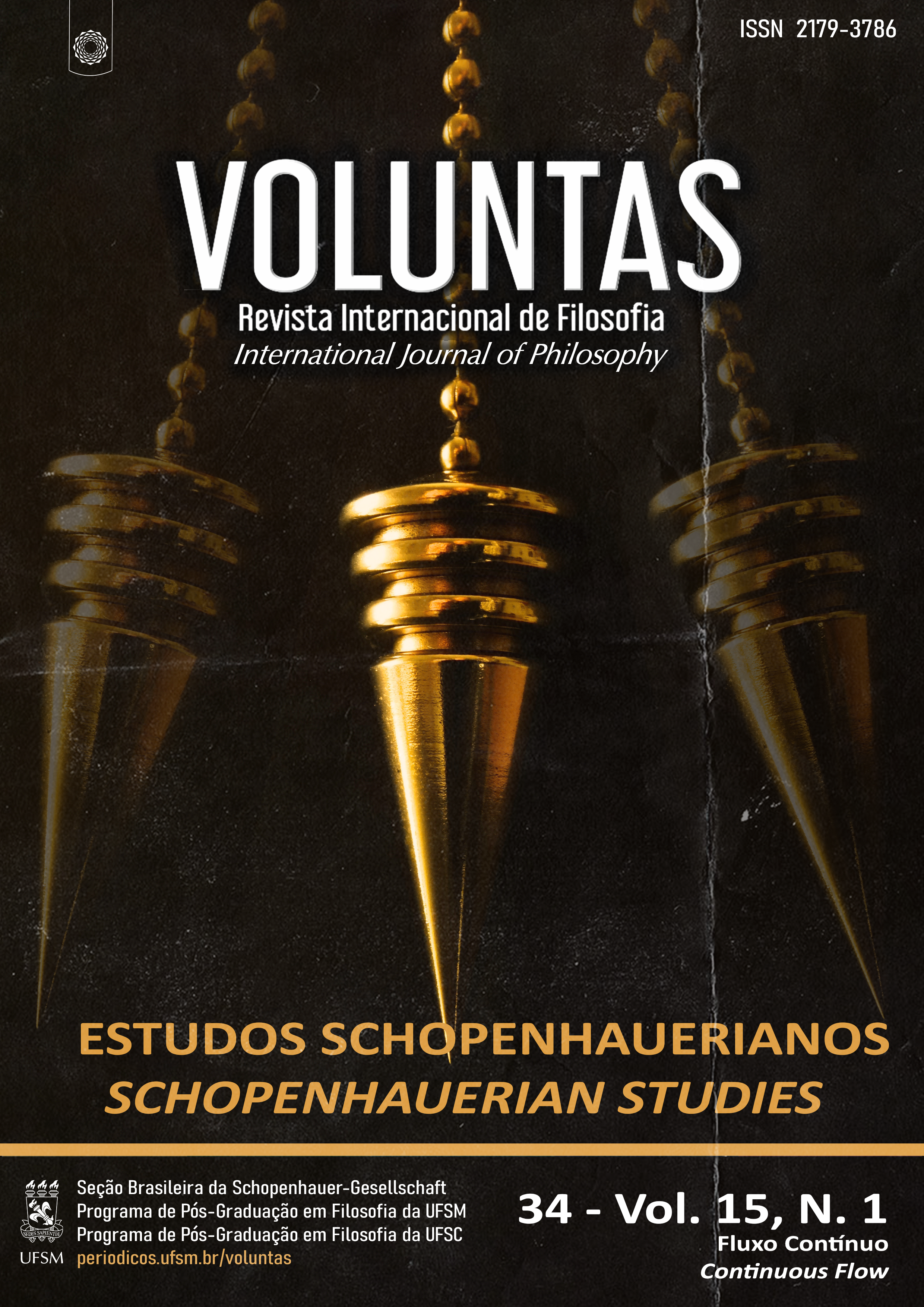From Schopenhauer's perspective, can abortion be considered unjust?
DOI:
https://doi.org/10.5902/2179378688225Keywords:
Abortion, Body, Injustice, NatureAbstract
The role of the body in Schopenhauer's philosophy is fundamental for understanding the will. For Schopenhauer, the body is the will made visible through the objectification of the will: this is so important that it constitutes the philosophical truth par excellence (κατ’ ἐξοχήν), according to the philosopher's own words. Therefore, the question to be answered is the following: how would Schopenhauer understand the body of the human fetus in relation to abortion? To this end, this article intends to present the different forms of conception of pregnancy with the aim of reflecting on the violation of another's will in light of Schopenhauer's conception of injustice (§ 62 of The World); other considerations will also be made taking into account the sixth category of injustice, exclusively exposed in the Berlin lectures, that is, the one concerning the violation of obligations derived from sexual relations.
Downloads
References
ALVES, A. Sobre a liberdade intelectual em Schopenhauer. Dissertação de Mestrado. Universidade Estadual de Londrina, 2023.
ALVES, A. Ensaio sobre o estoicismo e a razão prática em Schopenhauer. Revista Paranaense de Filosofia. v. 4, n. 1, p. 01 – 21, Jan./Jun., 2024.
ASSIS, M. de. A semana. Obras completas de Machado de Assis. 2º Volume (1894-1895). São Paulo: Editora Mérito, 1959.
BRANDÃO, E. A concepção de matéria na obra de Schopenhauer. São Paulo: Humanitas, 2008.
BARBOZA, J. Nota em: Metafísica da natureza. Trad. Jair Barboza. São Paulo: Editora Unesp, 2023.
CARDOSO, R. A ideia de justiça em Schopenhauer. Belo Horizonte, MG: Argvmentvm, 2008.
CARTWRIGHT, D. Historical Dictionary of Schopenhauer’s Philosophy. Toronto: The Scarecrow Press, 2005.
CARTWRIGHT, D. Schopenhauer: a biography. USA: Cambrigde University Press, 2010.
CHAVES, F. A.; WOLFFENBÜTTEL, Cristina Rolim. Cantando para o bebê antes de seu nascimento: relatos de mães sobre suas práticas
musicais na gestação. Revista da FUNDARTE, [S. l.], v. 56, n. 56, p. 1–28, 2023.
DARWIN, C. A expressão das emoções nos homens e nos animais. Prefácio de Konrad Lorenz. Trad. Leon de Souza Lobo Garcia. São Paulo: Companhia das Letras, 2009.
DURANTE, F. Entre heresias e atualidades de Arthur Schopenhauer. Campinas, SP: Editora Phi, 2022.
FRIAS, L. O argumento do valor intrínseco da vida humana contra a morte de embriões humanos. Revista Ethic@. Florianópolis, v. 11, n. 3, p. 239-259. Dez. 2012.
FRIAS, L. O que há de errado com o argumento da potencialidade? Revista ACTIO, nº 15, maio, 2013.
GREER, G. Sexo e destino: a política da fertilidade humana. Trad. Alfredo Barcelos. Rio de Janeiro: Rocco, 1987.
HOLBACH, B. de. Sistema da natureza ou das leis do mundo físico e do mundo moral. Trad. Regine Schöpke e Mauro Baladi. São Paulo: Martins Fontes, 2010.
KÜPPER, V. G. Der Begriff des Unrechts bei Schopenhauer. Em: Schopenhauer-Jahrbuch, edição número 74, p. 103-114, 1993.
MARCIN, R. In search of Schopenhauer’s cat: Arthur Schopenhauer Quantum-Mystical Theory of Justice. The Catholic University of America Press: Washington D.C, 2006.
MOORE, K. Embriologia clínica. Keith L. Moore, T. V. N. Persaud; com a colaboração de Mark G. Torchia. Tradução de Andréa Monte Alto Costa, et al. Rio de Janeiro: Elsevier, 2008.
PRADO, D. O que é aborto. São Paulo: Abril Cultural: Brasiliense, 1985.
RAMOS, F. C. A teoria da justiça de Schopenhauer. Revista ethic@. Florianópolis, v. 11, n. 2, p. 173-185, julho de 2012.
SAFRANSKI, R. Schopenhauer e os anos mais selvagens da filosofia. Tradução de William Lagos. São Paulo: Geração Editorial, 2011.
SCHOPENHAUER, A. Aforismos para sabedoria de vida. Tradução, notas e prefácio de Jair Barboza; revisão de Karina Jannini. São Paulo: Martins Fontes, 2002.
SCHOPENHAUER, A. Metafísica da natureza. Trad. Jair Barboza. São Paulo: Editora Unesp, 2023.
SCHOPENHAUER, A. Metafísica dos costumes. Trad. Eli Vagner Francisco Rodrigues. São Paulo: Editora Unesp, 2024.
SCHOPENHAUER, A. O mundo como vontade e como representação. Tomo I, 2ª edição revisada, tradução de Jair Barboza. São Paulo: UNESP, 2015.
SCHOPENHAUER, A. O mundo como vontade e como representação. Tomo II, tradução de Jair Barboza. São Paulo: UNESP, 2015.
SCHOPENHAUER, A. Sobre a liberdade da vontade. Apresentação de Oswaldo Giacoia Junior. Tradução Lucas Lazarini Valente e Eli Vagner Francisco Rodrigues. São Paulo: Editora Unesp, 2021.
SCHOPENHAUER, A. Sobre a quadrúplice raiz do princípio de razão suficiente. Tradução de Oswaldo Giacoia Jr. e Gabriel Valladão Silva. São Paulo: Unicamp, 2019.
SCHOPENHAUER, A. Sobre a vontade na natureza. Tradução de Gabriel Valladão Silva. Porto Alegre: LP&M POCKET, 2018.
SCHOPENHAUER, A. Vorlesung über Die gesamte Philosophie Band 2: Metaphysik der Natur. Meiner: Hamburg, 2019.
THOMSON, J. A defense of abortion. Philosophy and Public Affairs. Volume 1, p. 47–66, 1971.
WELCH, G.; PRETI, C.; HAMOND, L. O canto como comunicação interpessoal e intrapessoal. Orfeu, Florianópolis, v. 3, n. 1, p. 197–229, 2018.
Published
How to Cite
Issue
Section
License
Copyright (c) 2024 Antonio Alves Pereira Junior

This work is licensed under a Creative Commons Attribution-NonCommercial-ShareAlike 4.0 International License.
The submission of original manuscripts to this journal implies the transference, by the authors, of the copyrights for printed and digital publication. The copyrights of a published manuscript belong ultimately to the author, and only the copyright for its first publication is reserved to the journal. Authors may only use the same results in other publications explicitly indicating this journal as the medium of the original publication.
Licence
Attribution-NonCommercial-ShareAlike 4.0 International (CC BY-NC-SA 4.0) - This license lets others remix, tweak, and build upon your work non-commercially, as long as they credit you and license their new creations under the identical terms.






